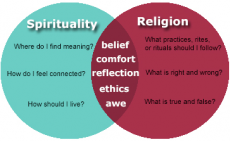
Email: lienaaltai@icloud.com
Total Article : 47
About Me:Sixth form student with an interest in a wide variety of topics such as languages, history, philosophy, politics and literature

Humanity’s yearning for meaning has for years watered the seeds of development for many different beliefs. Ranging from intricately organised and practiced religion, to a simple sense of spirituality experienced by many, this metaphysical aspect to humans has posed a riddle which is still pondered upon to this day.
As any matter of opinion, two extreme ends of the scale are separated by a vast quantity of stances and attitudes. Yet when it comes to the spiritual, even the most devout atheist Richard Dawkins acknowledges there is a spiritual part to humanity which is difficult to explain through empirics of science. Yet one may continue – what is the spiritual? Does the spiritual have to be contained to the belief in deity, afterlife, or reincarnation? Do abstract concepts such as love, justice and beauty not fall under this category too – after all, they too are non-physical abstract concepts?
To delve into the process of human thought is necessary when considering an empirical approach to this topic. The brain is a wonderful thing – the mere fact that we are pondering this question in the first place being almost incomprehensibly complex! The often used quote by Descartes “"I think, therefore I am" may be used in this context – do we think ourselves into existence? Does this sense of spirituality, belonging, meaning and being simply derive from our brain? However, thinking down this route can prove dangerous for some. To think of a human body without a non-physical, spiritual aspect is to think of a clump of cells. These cells, arranged correctly are animated through electrical impulses. The brain being a more complex set of cells has the capability of thought. This incredibly capability leads us to experience many emotions – spirituality being one of them. Yet spirituality for a hard empiricist is nothing but something that the mind has conjured up, a defence mechanism perhaps that follows our instinctive fear of death.

Are we willing to accept that we are meaningless lumps, lumbering around on this planet? For many, this poses a problem. This sense of spirituality is too strong to ignore for many and this is where religion comes into the equation. Whilst some may dismiss religion as blind faith, or as simply being stemmed from fear of the unknown, for many, religion allows a meaning to life that one may never experience until they get in touch with their spiritual side. Without a higher power, without meaning, without heaven and hell, what is to stop us as humans from simply doing as we please? Can we really trust our innate moral compass without a regulating power?
Whilst religious and non-religious beliefs continue to clash, there is one aspect that we cannot ignore. Humans are spiritual creatures. Good, evil, beauty, and justice continue to dictate our lives whether we believe that they stem from God or our minds. It is for this reason that our spiritual nature demands philosophising, yet many doubt we may ever find an answer.
Image URLS:
http://www.takingcharge.csh.umn.edu/enhance-your-wellbeing/purpose/spirituality/what-spirituality
http://spiritualityhealth.com/articles/what-difference-between-religion-and-spirituality

0 Comment:
Be the first one to comment on this article.